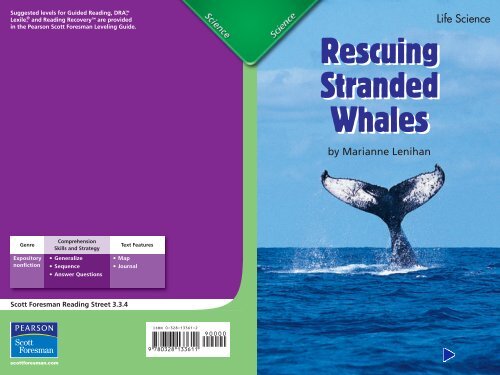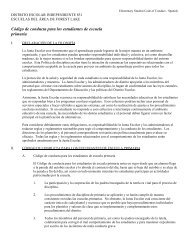Rescuing Stranded Whales - Catawba County Schools
Rescuing Stranded Whales - Catawba County Schools
Rescuing Stranded Whales - Catawba County Schools
You also want an ePaper? Increase the reach of your titles
YUMPU automatically turns print PDFs into web optimized ePapers that Google loves.
Suggested levels for Guided Reading, DRA, <br />
Lexile, ® and Reading Recovery are provided<br />
in the Pearson Scott Foresman Leveling Guide.<br />
Life Science<br />
<strong>Rescuing</strong><br />
<strong>Stranded</strong><br />
<strong>Whales</strong><br />
by Marianne Lenihan<br />
Genre<br />
Expository<br />
nonfiction<br />
Comprehension<br />
Skills and Strategy<br />
• Generalize<br />
• Sequence<br />
• Answer Questions<br />
Text Features<br />
• Map<br />
• Journal<br />
Scott Foresman Reading Street 3.3.4<br />
ì
Reader Response<br />
<strong>Rescuing</strong><br />
<strong>Stranded</strong><br />
1. How might the rescue of dolphins be<br />
similar to the rescue of whales?<br />
2. After reading about how whales are<br />
rescued, what<br />
<strong>Whales</strong><br />
other questions do you<br />
have about whales? How would you find<br />
answers to your questions? Use a graphic<br />
organizer to help arrange your thoughts.<br />
What I Know<br />
by Marianne Lenihan<br />
What I Want<br />
To Know<br />
What I<br />
Learned<br />
3. Rescuers surrounded the stranded whales.<br />
What other word or words mean almost<br />
the same as surrounded?<br />
4. In the journal on page 10, how long after<br />
the ship sets sail do the scientists spot a<br />
pod of whales?<br />
Editorial Offices: Glenview, Illinois • Parsippany, New Jersey • New York, New York<br />
Sales Offices: Needham, Massachusetts • Duluth, Georgia • Glenview, Illinois<br />
Coppell, Texas • Ontario, California • Mesa, Arizona
<strong>Whales</strong> are sea mammals. Many people<br />
like whales for the melodies of their songs.<br />
Whale songs have been called symphonies.<br />
Usually, whales swim the seas easily. But<br />
sometimes they get stuck in shallow water<br />
or grounded on a beach. This is known as<br />
being stranded or beached.<br />
Every effort has been made to secure permission and provide appropriate credit for<br />
photographic material. The publisher deeply regrets any omission and pledges to<br />
correct errors called to its attention in subsequent editions.<br />
Unless otherwise acknowledged, all photographs are the property of Scott Foresman,<br />
a division of Pearson Education.<br />
Photo locators denoted as follows: Top (T), Center (C), Bottom (B), Left (L), Right (R),<br />
Background (Bkgd)<br />
Opener: Digital Vision; 1 Digital Vision; 3 ©DK Images; 5 Digital Vision; 7 B. Jordan/<br />
UNEP/Peter Arnold, Inc.; 9 ©DK Images; 12 Digital Vision<br />
ISBN: 0-328-13361-2<br />
Copyright © Pearson Education, Inc.<br />
All Rights Reserved. Printed in the United States of America. This publication is<br />
protected by Copyright, and permission should be obtained from the publisher<br />
prior to any prohibited reproduction, storage in a retrieval system, or transmission<br />
in any form by any means, electronic, mechanical, photocopying, recording, or<br />
likewise. For information regarding permission(s), write to: Permissions Department,<br />
Scott Foresman, 1900 East Lake Avenue, Glenview, Illinois 60025.<br />
2 3 4 5 6 7 8 9 10 V0G1 14 13 12 11 10 09 08 07 06 05<br />
3
When a whale is stranded, its body<br />
weight presses on its heart and lungs. The<br />
whale can have a hard time breathing.<br />
Also, the whale’s body temperature can<br />
become very high without the cooling<br />
seawater. Its skin can dry out, crack, and<br />
become sore.<br />
Here’s how people help stranded<br />
whales: The whales are surrounded by<br />
volunteers and scientists. They pour cold<br />
water and chipped ice on the whales to<br />
keep them cool. The scientists use their<br />
supplies to do medical tests on the whales.<br />
4<br />
5
Sometimes all that stranded whales<br />
need is to be kept cool and calm until<br />
the tide rises. Then the rescuers herd the<br />
whales into a group and push them out<br />
into deeper water. If the whales find a<br />
deep channel of water, they are able to<br />
swim out to the open sea.<br />
Scientists do not fully understand why<br />
whales strand. One idea is that the lead<br />
whale becomes sick and swims off course.<br />
Then the other whales in the pod follow.<br />
Another thought is that harsh weather,<br />
such as blizzards and hurricanes, may upset<br />
the whales’ sense of direction.<br />
6<br />
7
In 1986, at Eastham, Massachusetts,<br />
three young pilot whales stranded. They<br />
had come into a shallow bay.<br />
Scientists were called to help. A crowd<br />
waited anxiously on the beach until they<br />
arrived. The scientists checked the whales.<br />
They decided to take them to an aquarium<br />
for care.<br />
The young whales were placed<br />
on stretchers. Then, front-end loaders<br />
lifted each whale into a truck. Only the<br />
front-end loaders could move the heavy<br />
whales. One by one, the three whales were<br />
lifted and placed gently into the truck.<br />
CANADA<br />
U.S.A.<br />
Atlantic<br />
Ocean<br />
Massachusetts<br />
Eastham<br />
CAPE COD<br />
8<br />
9
At the aquarium a crane moved the<br />
whales out of the truck and into a tank. It<br />
took the young whales a few days to get<br />
used to aquarium life. They were fed small<br />
fish stuffed with vitamins and medicines.<br />
This journal shows what happened<br />
on the day the whales were ready to be<br />
returned to sea!<br />
WHALE RESCUE JOURNAL<br />
8:00 A.M. Most of the water is drained<br />
from the aquarium tank.<br />
9:00 A.M. The whales are lifted out of<br />
the tank on stretchers.<br />
10:00 A.M. The stretchers are lifted by<br />
cranes into a truck.<br />
11:00 A.M. The truck drives the whales<br />
to a large ship.<br />
2:00 P.M. The whales are loaded onto<br />
the ship.<br />
4:00 P.M. The ship sets sail for deep<br />
ocean waters.<br />
6:00 P.M. The scientists on the ship<br />
search for a pod of whales.<br />
7:00 P.M. A pod of whales is spotted.<br />
Scientists fit each whale with a special<br />
radio tag to help track the whale.<br />
8:30 P.M. The stretchers are lifted by<br />
a crane. The whales are lowered into a<br />
special cage next to the ship.<br />
12:00 A.M. The whales have gotten<br />
used to the ocean water again. The cage<br />
is opened. The whales swim out to meet<br />
their new pod. Everyone cheers!<br />
10<br />
11
<strong>Whales</strong> know when they’re in trouble.<br />
Usually, they cooperate with their human<br />
rescuers. Although some whale rescues<br />
are not successful, many whales have been<br />
returned safely to their ocean home!<br />
Reader Response<br />
1. How might the rescue of dolphins be<br />
similar to the rescue of whales?<br />
2. After reading about how whales are<br />
rescued, what other questions do you<br />
have about whales? How would you find<br />
answers to your questions? Use a graphic<br />
organizer to help arrange your thoughts.<br />
What I Know<br />
What I Want<br />
To Know<br />
What I<br />
Learned<br />
3. Rescuers surrounded the stranded whales.<br />
What other word or words mean almost<br />
the same as surrounded?<br />
4. In the journal on page 10, how long after<br />
the ship sets sail do the scientists spot a<br />
pod of whales?<br />
12

















